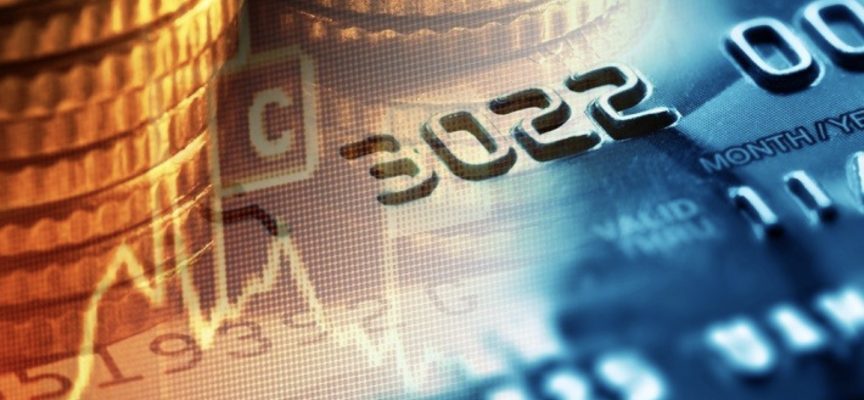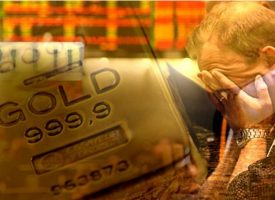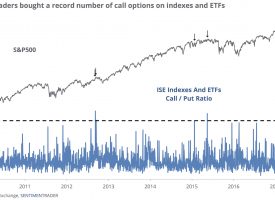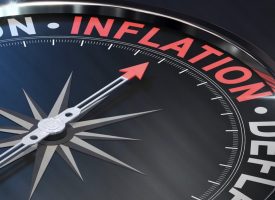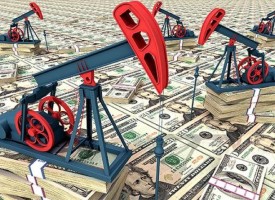On the heels of the Dow futures tumbling 900 and the price of gold surging above $1,700, Dr. Stephen Leeb shared with King World News his thoughts on the dangers of the Coronavirus, its impact on markets, and $20,000 gold.
Massive Bull Market In Gold
March 7 (King World News) – Dr. Stephen Leeb: I’ve been projecting a massive bull market in gold, with China leading the way. How, if at all, does Covid-19 affect that projection? My quick answer: The outbreak likely further strengthens both the short- and long-term case for gold.
Over the shorter term, by spotlighting gold as a safe haven, it lessens the chances of a meaningful correction in the metal, though one still is possible…
Listen to the greatest Egon von Greyerz audio interview ever
by CLICKING HERE OR ON THE IMAGE BELOW.
For the more important longer term, it has thrown into sharp relief the dollar’s weakness as a reserve currency. That should accelerate the timetable for a new gold-backed monetary system. And that would make a meaningful breakout above the previous highs in the $1,900 area come sooner rather than later. Ultimately, I continue to believe gold can trade well into five digits with a long-term target in the $20,000 area or higher.
Before looking at these projections in more detail, it will help to try to put Covid-19 into some perspective. According to the Centers for Disease Control (CDC), the 2018-19 flu season resulted in 35.5 million flu cases in the U.S., nearly half a million hospitalizations, and nearly 35,000 deaths. So far, and of course this could change, I’ve seen no credible projections that the harm from Covid-19 will come close.
Now realize that the above figures mean that last year’s flu infected more than 10 percent of the U.S. population. Around 1.5 percent of those people were hospitalized; roughly 7 percent of those hospitalized died.
What would the situation look like in China today if those same percentages prevailed with Covid-19 there? Most of China’s cases have been in Hubei province, population around 58 million. China has reported about 75,000 cases and fewer than 3,000 deaths. If Covid-19 hit the province as hard as the flu did last year in the U.S., the numbers would be far higher – translating into nearly 6 million cases, 90,000 hospitalizations, and more than 6,000 deaths.
Since Covid-19 was first identified in China, the death rate there has fallen from above 3 percent to under half of 1 percent. That dramatic decline is largely attributed to China’s learning curve in treating the virus. Other countries have learned from China. For example, Germany has reported more than 600 cases, none resulting in death.
Turning to another major outbreak, the 2009 flu pandemic that began in the U.S. and Mexico was catastrophic. It killed as many as 1 million people across the globe. And it coincided with the Great Recession. But it wasn’t the cause of the recession, nor did it have any apparent impact on the recovery.
All this makes it pertinent to ask why Covid-19 is causing such outsized anxiety here. The media has focused on each new case and each new fatality. It has paid far less attention to the fact that the initially high death rate in China has dropped by about 80 percent. It also has largely ignored the unusual fact that the virus seems largely to spare children, which should greatly help rein in its spread. But I’m not blaming the media. There’s more to it than that.
So why is the angst as great as it is here? I see it as at least in part a symptom of a broader decline in the U.S., one that began in the 1970s and has continued ever since and that lately has been accelerating.
Covid-19 is shining a harsh spotlight on the country’s failings. It is making it clear, among other things, that our health care system stinks, with life expectancies here among the lowest for a high-income country despite far higher per-capita spending. And no, this is not a political ad, it’s simply a fact that reflects a half century of thinking we could have our cake and eat it, too.
The virus, one response to which was the Fed’s move to lower interest rates to near zero, also points up the lack of growth opportunities here. Typically, low interest rates should spur investment. But business investment has been declining along with interest rates for a generation and there’s no signs that the even lower rates will cause it to pick up. Companies simply don’t see good opportunities for investment because they don’t see growth. And that reflects the multiple inadequacies of our physical and social infrastructure.
The investments that have been made have been in the wrong direction. From fracking to financial services, the arguments are compelling that past major American investments have been failures. Fracking, on a cash basis, is somewhere north of $200 billion. Its major long-term effect will be slowing U.S. development of sustainable energy. It is no coincidence that Tesla’s stock soared once it established a foothold in China.
Financial services, the fastest growing sector of the economy since the mid-1980s, is more a negative than a positive for the economy. Anyone investing in a mutual fund or paying a money manager is likely paying fees to underperform the market. While passive funds generally do better, most exclude the best-performing asset of the past generation, gold.
The record lows today on 10-year bonds are startling. No one now would be surprised to see yields dip into negative territory. We’ve become a country that panics, and if bond yields are your metric, the panic now is even greater than in 2008-09.
All these long-term problems here are part and parcel of why we have been losing ground to China. They have contributed to China being positioned to reshape the world more to its liking. And that continues to include eventually bringing about a new monetary system backed by gold. The fact that Covid-19 started in China, and that China was initially criticized for not acting quickly enough, doesn’t change these underlying, deeply entrenched dynamics.
The bottom line is that we simply can’t compete in today’s world especially against the likes of China. So does it really make sense for other countries to hold our dollars as the reserve currency and receive almost no interest for doing so – and if rates turn negative, actually have to pay to hold in reserve the currency of a country that has lost its way? It’s a rhetorical question.
One of the most striking factoids I came across in the past month came when I was researching a major Canadian telecom. The company was using Huawei’s products – even as Canada, at the behest of the U.S., was holding in house arrest the daughter of Huawei’s founder. Huawei’s products also are the 5G choice for most of our allies in Europe; in India; and in most of Asia.
One reason I don’t worry about Huawei as a security threat is that the Chinese don’t need Huawei to spy on us. A Wall Street Journal article on December 30 of last year revealed that a Chinese hacking operation called Cloud Hopper had been going on for more than three years and “was much bigger than previously known. It goes far beyond …. 14 unnamed companies…stretches across at least a dozen cloud providers… It’s an open question whether the hackers remain inside the companies’ networks today.”
The article further implied that the Department of Homeland Security and the Justice Department were also hacked. “The hackers used their victims’ networks like dropboxes for what they stole…At times the attackers taunted their hunters, by registering domain names like gostudyantivirus.com….”
The U.S., which invented the internet, the laser, the transistor, and almost everything else foundational to current IT, is a shadow of what it was. Do we really think we will maintain our role as a critical cog in trade, with the dollar remaining the major reserve currency?
It no longer makes sense. Covid-19, by shedding such a harsh light on our flaws and pushing interest rates down to almost nothing, only makes a gold-backed reserve currency basket likely to come sooner – in steps – than otherwise. Gold has moved up the investment ladder from diversification to the most critical investment you can own.
Covid-19 may prove the final blow that unmasks the rot at the core of the U.S. economy, powerful though it might still seem on the surface. And sad as I find that to be, it will be great for gold.
***To listen to one of the most important interviews of this year with David Stockman discussing the wild swings in stocks, bonds, and gold (Stockman is very bullish on gold), as well as what investors should be doing right now and more CLICK HERE OR ON THE IMAGE BELOW.
David Stockman
ALSO RELEASED: David Stockman – 1,000 Point Intraday Swings Are A Warning The Fantasy Of The Last Few Decades Is Finally Coming To An End CLICK HERE TO READ.
© 2020 by King World News®. All Rights Reserved. This material may not be published, broadcast, rewritten, or redistributed. However, linking directly to the articles is permitted and encouraged.

